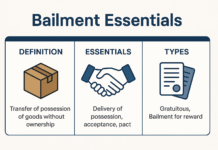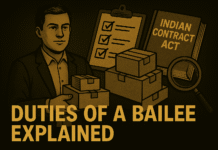3. Dissolution on the Happening of Certain Contingencies-According to S.42, subject to the contract between the partners a firm is dissolved—
(a) If constituted for a fixed term, by the expiry of the term;
(b) If constituted to carry out one or more adventures or undertakings, by the completion thereof;
(c) By the death of partner; and
(d) By the adjudication of a partner as an insolvent. It may be noted that a firm is dissolved on the happening of any of the following contingencies, provided that there is no agreement to the contrary—
(a) Expiry of Term—It nay be noted that where a firm is constituted for a fixed term, it becomes dissolved on the expiry of that term, unless the dissolution is prevented by an agreement between the partners.
(b) Completion of the Business-When the business of the firm is completed a partnership is dissolved by operation of law S. 42 provides that where a firm is constituted to carry out one or more adventures or understanding it is dissolved by the completion thereof. Where a firm is constituted for a particular term or venture, and a partner dies earlier, it would end as from the date of death irrespective of the fact that neither the term has expired nor business completed.
(c) Death of Partner-It is to be noted that the effect of cl. (c) of S. 42 is that in the absence of a coontract to the contrary, a partnership is dissolved by the death of a partner. Death of a partner means the dissolution of the partnership.
(d) Insolvency of Partner –A firm is dissolved by the adjudication of a partner as an insolvent. Thus, the insolvency even of a single partner operates as a dissolution. This being also subject to an agreement to the contrary, the partners can agree that the insolvency of a partner will not have the dissolving effect. But such an agreement will be subject to the provisions of the Act relating to compulsory dissolution, namely, that on the insolvency of all the partners or all but one the firms would stand compulsorily dissolved.
4. Dissolution by Notice of Partnership at Will – According to S. 43
(1) where the partnership is at will the firm may be dissolved by any partner giving notice in writing to all the other partners of his intention to dissolve the firm.
(2) The firm is dissolved as from the date mentioned in the notice as the date of dissolution or, if no date is so mentioned, as from the date of the communication of the notice.
Partnership at will, means partnership the duration of which has not been fixed. It may be dissolved at any time by any partner by giving notice of h is intention to dissolve it. Notice should be in writing, signed by the partner giving it and should be served upon all the partners. The notice must not be ambiguous or vague. It must be factual, explicit and final. A notice that accounts should be rendered and that a certain work, must not be proceeded with was held to be not a notice of dissolution. A majority resolution to dissolve the firm was also held to be not a notice of dissolution. But where the partners stopped the work some three years before a suit was filed by. one of the partners for accounts, it was held that the firm stood dissolved from that time by implied agreement and, therefore, the suit for accounts was time-barred. He could not save himself from the bar of time by subsequently giving a notice of dissolution. The firm is dissolved as from the date mentioned in the notice or, if no date is mentioned, as from the date of communication of notice. On the other hand a Partnership which is not at will cannot be determined by notice. For Example; in Moss Vs. Elphick, 1910, a deed, constituting a partnership of two persons for an undefined time, provided that the firm could be terminated “by mutual agreement only”. It was held that.the notice of dissolution given by one of the partners was invalid as the operation of S. 43 was excluded by agreement to the contrary. In Erach F. D. Mehta Vs. Minoo, (1970) 2 S.C.C. 724 : A.I.R. 1971 S.C. 1653, the Supreme Court has expressed the opinion that in a partnership consisting of two partners only, if there is any provision regulating the mode ofretirement, it will in,essence be an agreement as to dissolution. The firm will not be “at will” and the provision relating to retirement will have to be followed for dissolution also. In Mc Leod Vs. Dowting, (1927) 43 T.L.R. 655, -where a partner sent a notice of dissolution to his only other partner and died before the other received the notice, it was held that the firm became dissolved by the death of a partner and not by notice.


















